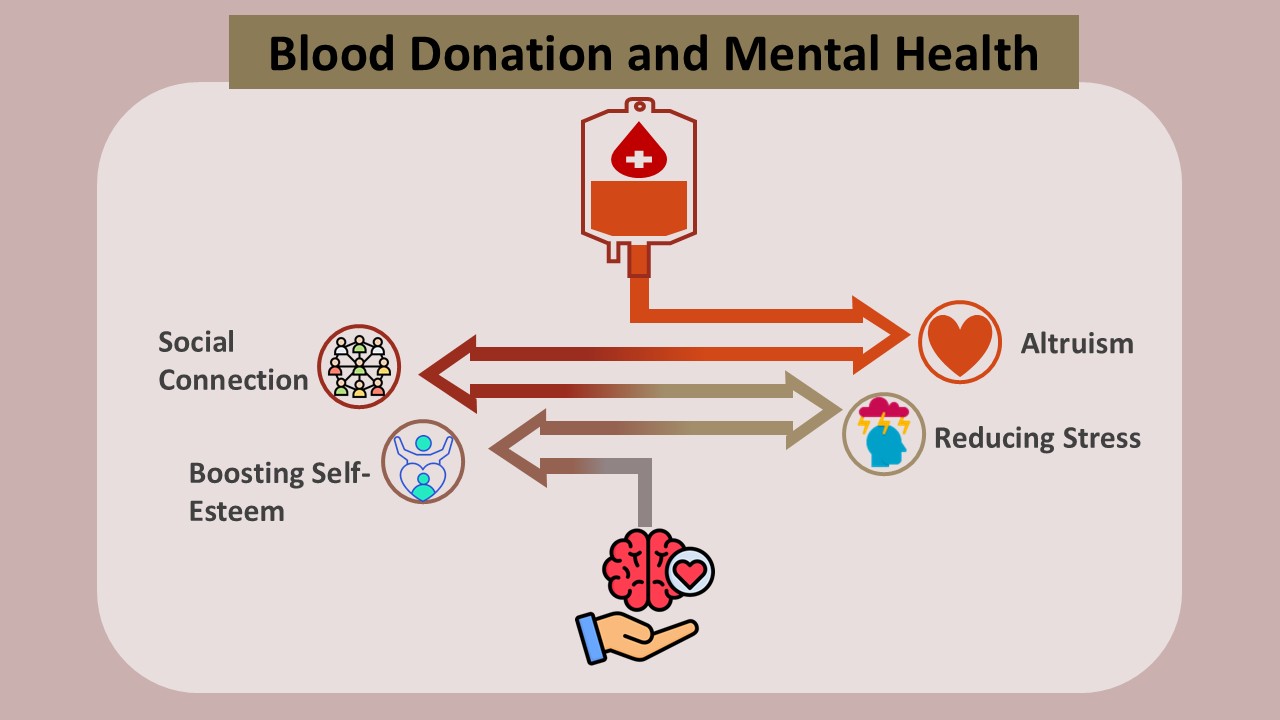
Blood donation and mental health


Blood donation
is a vital component of public health, providing life-saving resources for
medical procedures and emergencies. While the physical benefits of blood
donation are well-documented, its relationship with mental health is an
emerging area of research. Though it may seem like a small act, donating blood
can have a significant impact—not only for the recipient but also for the
donor.
1. A Sense of Purpose and Altruism
One of the
primary psychological benefits of blood donation is its association with
altruistic behaviour. Altruism—the selfless concern for the well-being of
others—has been linked to improved mental health outcomes, including increased
life satisfaction and reduced symptoms of depression. Donors frequently reports
feelings of satisfaction and fulfilment, which can enhance psychological
well-being.
Research also
indicates that young blood donors tend to report better mental health than non-donors,
a phenomenon partly explained by the “healthy donor effect.” People who donate
blood often lead healthier lifestyles and generally report a higher quality of
life (1).
2. Reducing
Stress
Donating blood
can also help lower stress level. The act of donation stimulates the release of
endorphins, oxytocin, and dopamine - chemicals that enhance mood, promote a
sense of well-being, and counteract the negative effects of cortisol (2).
Furthermore, blood
donation helps regulate iron levels in the body. Excess iron is associated with
various health issues, while regular blood donation can help maintain optimal
iron levels, potentially reducing long-term health risks associated with iron
overload (3). This regulation not only benefits physical health but may also
contribute to improved psychological well-being, further supporting donors mental
health.
In addition, blood
donation has been shown to reduce inflammatory markers such as pentraxin-3 and
high-sensitive C-reactive protein. It also increases antioxidant activity,
particularly through the elevation of superoxide dismutase (SOD) levels, which
may help maintain a healthier oxidative balance in the body (4). Since chronic
inflammation and oxidative stress are associated not only with physical
illnesses like cancer, diabetes, and cardiovascular disease but also with
mental health conditions such as depression and anxiety, these biological
benefits of blood donation may indirectly support better mental well-being.
3. Fostering Social Connection
Another valuable
benefit of donating blood is its ability to foster social connection. Donation centers
and blood drives often serve as social hubs where individuals interact with
healthcare professionals and fellow donors. Coming together for a meaningful
cause like blood donation cultivates a sense of kindness and community. It
helps build stronger social bonds and a supportive atmosphere, both of which
are beneficial for mental health.
Sharing the
experience of donating blood can provide a sense of purpose and reduce feelings
of loneliness, making individuals feel more supported and connected. Previous
studies show social connectedness helps protect adults in the general
population from depressive symptoms and mental health disorders (5).
In addition, blood donation offers a
tangible way for people to express empathy and demonstrate social
responsibility. This reinforces a positive self-identity and strengthens a
sense of connection to the broader community. Feeling a sense of belonging and
making a meaningful contribution can help buffer against loneliness and
isolation—factors often associated with poor mental health.
4. Boosting Self-Esteem
Blood donation
is a prosocial act that can enhance well-being through positive emotions such
as pride and the "warm-glow" effect. Research shows that blood donors
frequently experience feelings of pride and satisfaction, which can
significantly contribute to their overall mental well-being and resilience (6).
Moreover, the
act of donating blood can strengthen self-esteem by reinforcing an individual's
sense of value and purpose. Knowing that one’s actions have directly save lives
fosters a profound sense of personal achievement and self-worth. Each donation
serves as tangible evidence of an individual's ability to make a meaningful
difference, supporting the development of a more positive self-image. Over
time, this can lead to greater self-confidence and a stronger sense of identity
as a compassionate and socially responsible person.
Conclusion
The benefits of
blood donation extend beyond its life-saving impact on recipients to include
meaningful mental health advantages for donors. The psychological benefits
include improved mood and self-worth, reduced stress levels, and enhanced
social connectedness.
In a world where
many people feel rushed, isolated, or overwhelmed, donating blood serves as a
powerful reminder that small, kind actions can make a big difference. Individuals
who regularly participate in such altruistic activities often report better
mental and physical health, and may enjoy longer, more fulfilling lives.
References:
1. Rigas AS,
Skytthe A, Erikstrup C, Rostgaard K, Petersen MS, Hjalgrim H, et al. The
healthy donor effect impacts self-reported physical and mental health - results
from the Danish Blood Donor Study (DBDS). Transfusion Medicine. 2019.
2. Maspul KA.
Can Blood Donation Reduce Stress and Boost Mental Clarity in High-Pressure Jobs.
2024.
3. Rahman MM,
Karki S, Hayen A. A methods review of the" healthy donor effect" in
studies of long?term health
outcomes in blood donors. Transfusion. 2022,1;62(3):698-712.
4. Yunce M,
Erdamar H, Bayram NA, Gok S. One more health benefit of blood donation: reduces
acute-phase reactants, oxidants and increases antioxidant capacity. Journal of
Basic and Clinical Physiology and Pharmacology. 2016,1;27(6):653-7.
5. Wickramaratne
PJ, Yangchen T, Lepow L, Patra BG, Glicksburg B, Talati A, Adekkanattu P, Ryu
E, Biernacka JM, Charney A, Mann JJ. Social connectedness as a determinant of
mental health: A scoping review. PloS one. 2022,13;17(10):e0275004.
6. Ferguson E,
Masser B. Emotions and prosociality: Lessons for blood donation. Affective
determinants of health behavior. 2018,16:377.